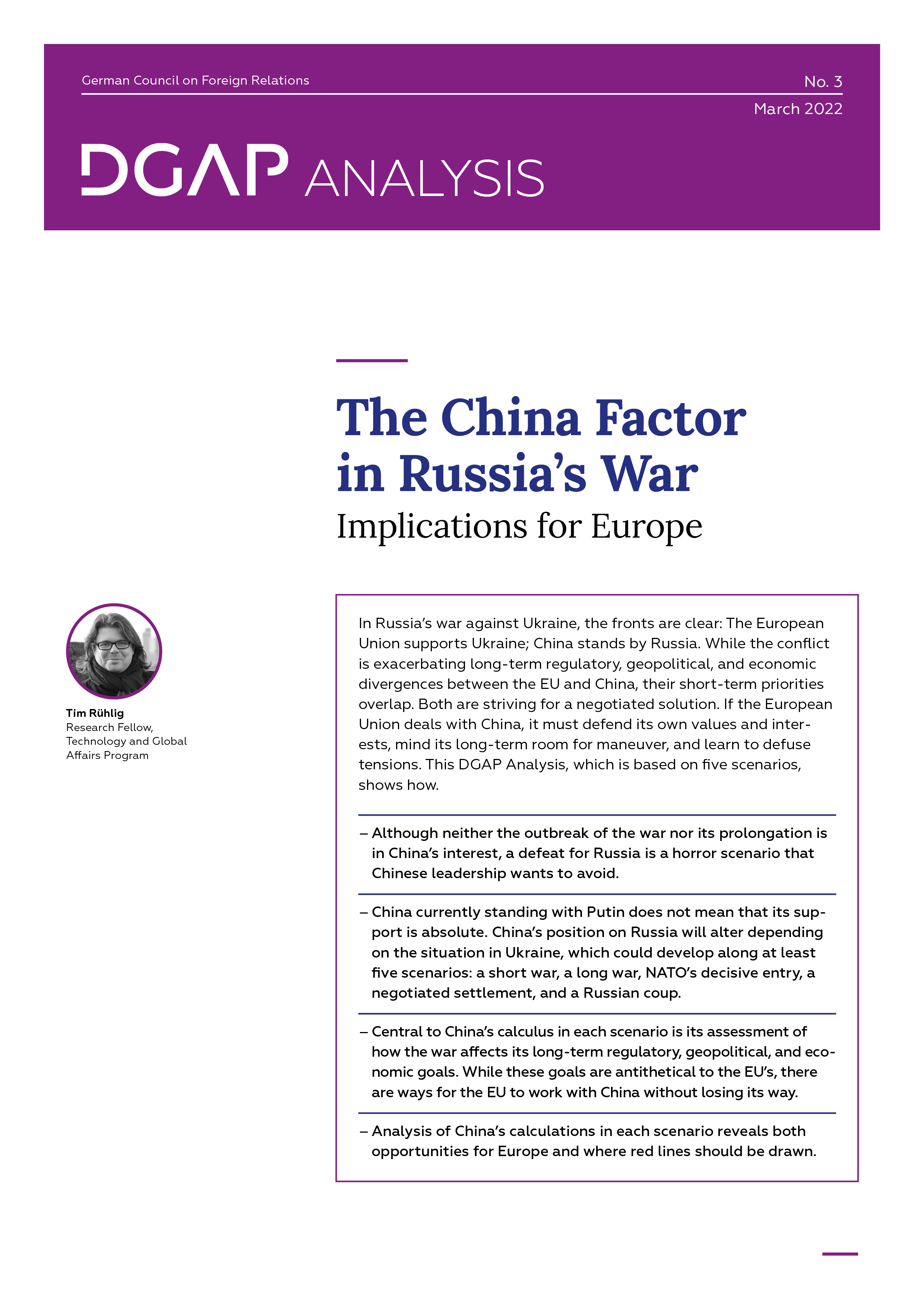Please note: Below you will find the introduction to DGAP Analysis No. 3. To read the entire text, including footnotes and citations, download the full PDF here.
|
|
|
|
Introduction
This much is clear: China will play an important role in the outcome of the Russian invasion of Ukraine, whether by active involvement or abstention. Yet Western observers interpret where China’s role might lead very differently. Optimists point out that the People’s Republic of China (PRC) has no interest in war but enormous influence over Russia. The Chinese Communist Party (CCP), they say, will exercise this power because war causes instability that the CCP wants to avoid – especially now in the run-up to fall 2022 when the Party Congress elects its leadership. The optimists thus believe that China has sufficient empathy for immediate Western aims in Ukraine to act as a mediator. Pessimists, however, argue that China’s partnership with Russia will erode Western sanctions and allow President Vladimir Putin’s regime to remain in power, propping up the long-term challenge to Western order.
Both positions are, in fact, compatible if one draws a distinction between China’s short- and long-term perspectives. In the short term, the European Union and China indeed have overlapping interests that make cooperation between them possible. The CCP’s dislike of instability gives it a stake in resolving the fighting. But since Europe’s interest in ending the war is stronger than the PRC’s, the question is how to tap the potential for cooperation or at least prevent China from increasing its support of Russia. In the long term, however, China will continue to promote a form of order antithetical to the West, as elaborated in the February 4 statement by Russia’s and China’s leaders (see “Ambivalent Partnership with Russia” below). The EU, however, needs some form of cooperation with China – both to curb Russia’s aggressive expansionism and to achieve long-term goals like global climate adaptation. Therefore, the current situation is a test of Europe’s ability to deal with such divergences of interest vis-à-vis China.
| Ambivalent Partnership with Russia: China’s Approach to the War |
|---|
|
Only weeks before the war started, Chinese President Xi Jinping and Russian President Vladimir Putin signed a foundational declaration. The document reads like a pact of non-aggression between the two leading autocracies of our time. It declares that the friendship of the two states has “no limits.” The statement is historical. Almost exactly 50 years earlier, China had gone in the opposite direction when it signed the Communique of Shanghai, which marked the PRC’s turn from the Soviet Union to the United States. Today, China considers Russia its partner in the competition with the US. China has adopted Russia’s terminology, not speaking of a “war” or an “invasion,” but of a “special military operation.” At the same time, China repeats its commitment to the principle of territorial integrity and acknowledges the sovereignty of Ukraine. China abstained from three crucial votes in the United Nations Security Council and General Assembly – neither voting with Russia nor against it. |
For Europe, this raises the question of whether and how to engage the People’s Republic in its own efforts. The increasing international isolation of Russia puts China more and more in the role of the only outside actor that has significant leverage over Russia. To this day, the PRC is largely choosing to avoid pressuring the Kremlin while also limiting its support. While the PRC is unlikely to take a mediating role, the EU should strive to incentivize China to support Russia as little as possible and – behind the scenes – support meaningful negotiations. To this end, the EU should continue to emphasize the cooperative potential of the PRC, avoid any rhetoric hinting at an ideological bloc confrontation that pushes China into the camp of authoritarian Russia, continue working for a global consensus isolating Russia, and increase the reputational cost for supporting the Kremlin. Meanwhile, it must also prepare instruments to pressure China into close collaboration with Western partners. A unified Western alliance that was prepared to enact targeted secondary sanctions against China if it were to cross the red line of supporting the Russian Federation militarily could have a deterring effect.
This analysis is based on three assumptions:
- The length and intensity of the war will shape opportunities and risks for the PRC. China will mostly likely consider its choices rationally along five obvious scenarios, which are not necessarily mutually exclusive: short war, long war, NATO becoming a war party, negotiated settlement, and coup in Russia. In each of these scenarios, China’s actions will be guided by their long-term implications for the global political order, geopolitics, and geo-economics.
- China is fundamentally inclined to support Russia. Both countries are united by their rivalry with the West, especially with the United States, for reasons of political order and geopolitical alliances. However, it is not only China’s strategic partnership and personal affinity with Russia, but also its own interests that lead it to weigh the possibilities and risks of taking sides.
- No matter how the war develops, the way that China calculates its risk and actions remains quite constant. In each of the five scenarios detailed here, the PRC will behave reactively, cautiously, and opportunistically to achieve its own strategic goals or avert risks. China now finds it imperative to prevent a Russian defeat, especially since all these scenarios confront it with medium- and long-term risks.


